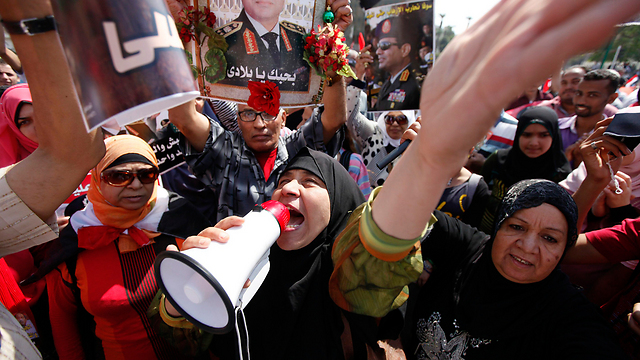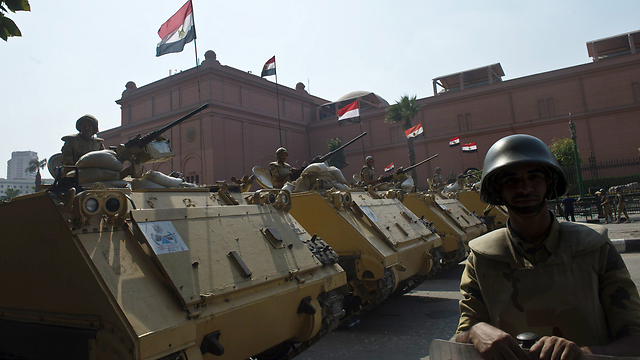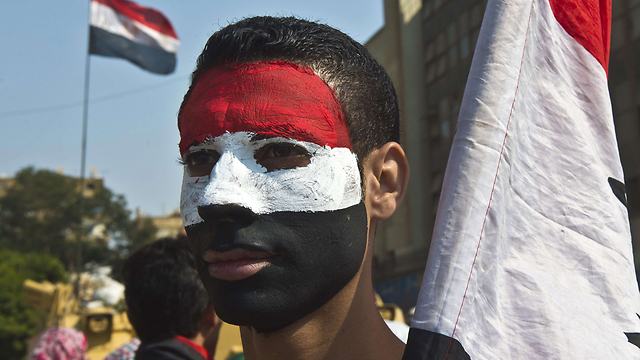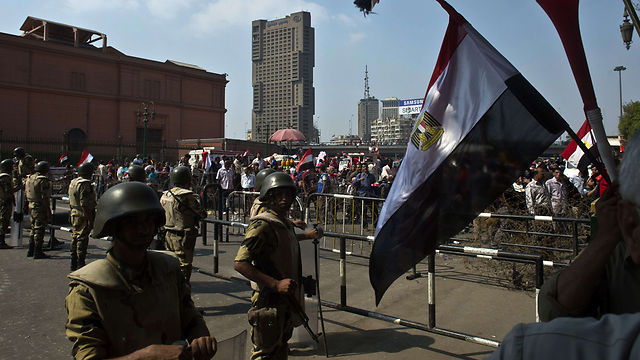Rival crowds of supporters of Egypt's military and backers of the Islamist president deposed by the army poured into streets around the country Sunday, as a holiday marking the anniversary of the last war with Israel turned into a showdown between the country's two camps.
Several thousand supporters of the military rallied in Cairo's central Tahrir Square, waving Egyptian flags, blowing whistles and touting posters of army chief Gen. Abdel-Fattah al-Sisi, who ousted President Mohammed Morsi three months ago. In a festive atmosphere, a military band in green jackets and off white pants played, and men spun in whirling dervish-style dances.
Related stories:
- Morsi ouster: Meet Egypt's newest leaders
- 40 years after Yom Kippur War: The Egyptian perspective
- Morsi: We won't forget 1973 'victory' over Israel
At the same time, thousands of Islamist backers of Morsi held marches around the city, shouting slogans against al-Sisi and some of them heading toward Tahrir Square, vowing to force their way into the sprawling plaza. That raised the possibility of violent clashes between the two sides.
Tahrir Square (Photo: Reuters)
Tahrir Square (Photo: AFP)
Police fired in the air and lobbed tear gas to push back several pro-Morsi marches as they neared Tahrir. Soldiers barricaded entrances to the square with barbed wire and armored personnel vehicles. Metal detectors were installed at the entrances and demonstrators pouring into the square were searched by troops.
"The people have one demand: Remove al-Sisi and the president," Islamist protesters chanted, referring to the interim president installed after Morsi's fall.
Violence quickly erupted in southern Egypt, where one Morsi supporter was killed in the town of Dalga. Police opened fire on a march by Islamists after some of the protesters shot at police with birdshot, according to the provincial security chief, Osama Metwali.
Dalga, in southern Minya province, is an Islamist stronghold that security forces raided last month to uproot militants who had driven out local police.
Sunday is the 40th anniversary of Egypt's opening strike against Israel in the 1973 Mideast war, a day that is celebrated every year here as a victory over Israel, though the war itself ended in a stalemate.
Now it has become mired in Egypt's political turmoil. Three months after Morsi's ouster in a July 3 coup, his Muslim Brotherhood and its Islamist allies are aiming to show their cause remains alive despite a crackdown that has crushed its leadership.
(Photo: AFP)
(Photo: AFP)
That spirit was in evidence in Tahrir, where some of the demonstrators used the occasion to campaign for al-Sissi to contest the presidential election slated for early 2014. They distributed a petition calling for el-Sissi to run.
Morsi was Egypt's first civilian president, following four who hailed from a military background whose combined 60 years in power stretch back to the early 1950s.
Interim President Adly Mansour gave a nationally televised speech Saturday night urged people to take to the streets to celebrate the Oct. 6 anniversary and "support your army." His media adviser, Ahmed el-Muslemani, said anyone demonstrating against the military during the holiday was doing the work of foreign "agents."
Ushering in the commemoration of the war, some two dozen F-16 jet-fighters staged a celebratory flight over Cairo, a city of 18 million whose streets were uncharacteristically empty by early afternoon even though Oct. 6 has traditionally been a national holiday. Only the scream of the jets broke the quiet.
Tahrir Square is the birthplace of the 2011 uprising against autocrat Hosni Mubarak and has since been the site of choice for Egyptian uprisings. The possibility of bloodshed there and on an occasion revered by most Egyptians is the latest evidence of the destructive schism that began to surface soon after Morsi's narrow election victory in June 2012.
Morsi was ousted in a July 3 coup that followed demonstrations by millions of Egyptians demanding that he step down. Egypt's first freely elected president, Morsi has since been detained in an undisclosed location, something that his supporters refer to as a "kidnapping."
Sunday's faceoff will be the latest episode in the turmoil roiling Egypt since Mubarak's ouster in February 2011. The military-backed government has since Morsi's departure rounded up at least 2,000 members of his Muslim Brotherhood, including most of the Islamist group's leaders. A crackdown on sit-in protest camps by Morsi's supporters and subsequent violence left at least 1,000 people dead.
Brotherhood supporters have since been staging near daily protests to demand Morsi's reinstatement. Their numbers have greatly dwindled in recent weeks but they have been energetically mobilizing for Sunday's rallies, claiming that they want to celebrate the war's anniversary while denouncing the military leadership that toppled Morsi, Egypt's first freely elected president.
The Brotherhood claims that its protests are peaceful, but there have over the past three months been cases when Morsi's supporters have carried and used firearms, clubs or firebombs.
Liberal politician Khaled Dawoud was attacked by a mob of Morsi supporters this weekend when he was inadvertently caught up in a protest. He said he tried to drive away from the scene but heavy traffic allowed his pursuers to catch up and break his car's windows with rocks.
Dawoud said they stabbed him several times, including once near his heart, and attempted to saw off his left hand. Dawoud, who is the spokesman for the liberal al-Dustour party led by reform leader Mohamed ElBaradei, remains hospitalized.
Dawoud relentlessly campaigned against Morsi's rule but has also criticized the violent crackdown against the Brotherhood and the media's vilification of the group.
It is rare for a figure as prominent as Dawoud to be caught up directly in the widespread political violence. Apart from the bloodshed, the deep political divisions among Egyptians are manifested in a multitude of ways every day as supporters of the military seek to ostracize Brotherhood members in government departments, the education system and trade unions, with heated arguments and fist fights now commonplace.
Violence has meanwhile continued in the northern part of Egypt's strategic Sinai peninsula, where militants, some with al-Qaeda links, have been targeting security forces with growing frequency in what is fast becoming a full-fledged insurgency.
A pair of suspected militants on Sunday killed a policeman in the coastal city of El-Arish in northern Sinai. Army troops also fired on a car near the border with Gaza. Gunmen inside the vehicle returned fire before they fled the scene. At least 10 explosive devices prepared to be remotely detonated were found in the car, according to security officials. They spoke on condition of anonymity because they were not authorized to speak to the media.
- Receive Ynetnews updates
directly to your desktop



















